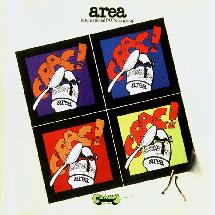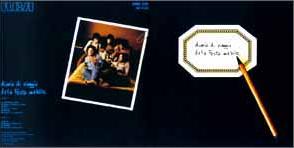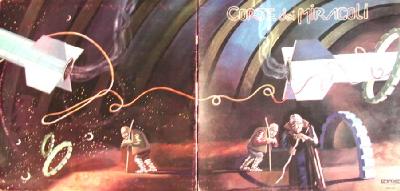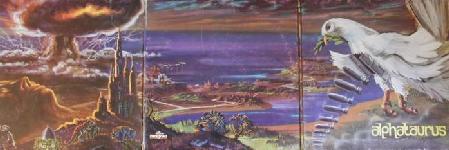 The
place of Area in the Itaprog movement is undoubtedly significant. The
contributions of this famous group merit inclusion as classic
progressive rock, but it must be recognized that Area were also major
players in the ‘fusion’ and ‘world’ currents. In addition they were
proficient at avant-garde jazz and could even eke out a ‘mean’ blues –
plus their Greek vocalist Demetrio Stratos made seminal contributions
to scientific analysis of the human voice as a musical instrument:
Musicologists currently are still trying to come to grips with Stratos’
solo discs, formalized statements of his extraordinary abilities. And
yet the idiom is all present on the Area albums that preceded. Aside
from its virtuosity, the most striking feature of Stratos’ vocal style
is the integration of Arabian influence. There is a canon of four Area
studio records, of which the third, Crac! (1975), presents the
least difficulty in terms of assimilation. It is the most positive of
the canon with regard to its message, indeed a welcome respite from the
mind-numbing seriousness of the preceding Caution, Radiation Area.
The key to understanding this music is the realization that it is the
best imaginable jazz-rock fusion. Juxtaposed with each other the
separate sections mean something emotionally, not just aesthetically.
The
place of Area in the Itaprog movement is undoubtedly significant. The
contributions of this famous group merit inclusion as classic
progressive rock, but it must be recognized that Area were also major
players in the ‘fusion’ and ‘world’ currents. In addition they were
proficient at avant-garde jazz and could even eke out a ‘mean’ blues –
plus their Greek vocalist Demetrio Stratos made seminal contributions
to scientific analysis of the human voice as a musical instrument:
Musicologists currently are still trying to come to grips with Stratos’
solo discs, formalized statements of his extraordinary abilities. And
yet the idiom is all present on the Area albums that preceded. Aside
from its virtuosity, the most striking feature of Stratos’ vocal style
is the integration of Arabian influence. There is a canon of four Area
studio records, of which the third, Crac! (1975), presents the
least difficulty in terms of assimilation. It is the most positive of
the canon with regard to its message, indeed a welcome respite from the
mind-numbing seriousness of the preceding Caution, Radiation Area.
The key to understanding this music is the realization that it is the
best imaginable jazz-rock fusion. Juxtaposed with each other the
separate sections mean something emotionally, not just aesthetically.
 I
am including a review of Diario di Viaggio della Festa Mobile
(1973), because it is unclear to me that the classic status of this
record – known well enough around the time of the inception of this
project (so very long ago) – has remained in the collective memory. It
is indeed one of the greats of 70s Itaprog. The band is usually
referred to as Festa Mobile, but it may be that this designation is
simply extracted from the album title, which translates as ‘Travel
Journal of the Movable Feast’. Now, this is an interesting mixed
metaphor, given that a movable feast is a religious celebration that
‘moves’ within the calendar from year to year, usually because it falls
on a day of the week rather than a specific date. So one ultimately
receives an impression of spatial movement emanating from temporal
flexibility. I guess it’s really a case of being in the right place at
the right time, at least long enough for making some pretty tolerable
music.
I
am including a review of Diario di Viaggio della Festa Mobile
(1973), because it is unclear to me that the classic status of this
record – known well enough around the time of the inception of this
project (so very long ago) – has remained in the collective memory. It
is indeed one of the greats of 70s Itaprog. The band is usually
referred to as Festa Mobile, but it may be that this designation is
simply extracted from the album title, which translates as ‘Travel
Journal of the Movable Feast’. Now, this is an interesting mixed
metaphor, given that a movable feast is a religious celebration that
‘moves’ within the calendar from year to year, usually because it falls
on a day of the week rather than a specific date. So one ultimately
receives an impression of spatial movement emanating from temporal
flexibility. I guess it’s really a case of being in the right place at
the right time, at least long enough for making some pretty tolerable
music. Corte
dei Miracoli is another very interesting one-shot eponymous album.
It is late, coming out in 1976 on the short-lived progressive Grog
label, and it represents a remarkable situation where through the
posthumous release of tapes and acetates one can trace the development
of a band over several years up to the production of a marvelous
classic. They, or their members, put nothing out previously, but in
1972 a band called Il Giro Strano, which featured one of Corte’s two
keyboardists, came close to completing an album, with a more
rudimentary rock format than Corte but no lack of refinement or
sensibility. From the next two years basement demos and live cassette
tapes exist showing a band that is no longer ‘tight’ – where the
instrumentalists may have lost their fleeting magic, yet where the
overall idiom is magnificently experimental in general rock music
terms. The end results of the development may be late in arriving, but
for this very reason, perhaps, they attain the pinnacle.
Corte
dei Miracoli is another very interesting one-shot eponymous album.
It is late, coming out in 1976 on the short-lived progressive Grog
label, and it represents a remarkable situation where through the
posthumous release of tapes and acetates one can trace the development
of a band over several years up to the production of a marvelous
classic. They, or their members, put nothing out previously, but in
1972 a band called Il Giro Strano, which featured one of Corte’s two
keyboardists, came close to completing an album, with a more
rudimentary rock format than Corte but no lack of refinement or
sensibility. From the next two years basement demos and live cassette
tapes exist showing a band that is no longer ‘tight’ – where the
instrumentalists may have lost their fleeting magic, yet where the
overall idiom is magnificently experimental in general rock music
terms. The end results of the development may be late in arriving, but
for this very reason, perhaps, they attain the pinnacle.
 Some
have sought to cast doubt on the classic status of the eponymous
one-shot album by Alphataurus that came out in 1973. This is a
difficult record to come to grips with, although it is unclear why that
should be so. It rewards repeated listening, which presumably is the
overriding criterion of achievement. It is also a model to serve as an
object study for those who wish to construct episodic rock music that
maintains a pervasive atmosphere while exploring contrasting themes and
sonorities. And for this very reason, it is especially unfortunate that
the follow-up album was not released. In fact it was left incomplete,
and the posthumous issue (Dietro L’uragano) has only the rhythm
track with some basic keyboard parts, but no guitar or voice.
Some
have sought to cast doubt on the classic status of the eponymous
one-shot album by Alphataurus that came out in 1973. This is a
difficult record to come to grips with, although it is unclear why that
should be so. It rewards repeated listening, which presumably is the
overriding criterion of achievement. It is also a model to serve as an
object study for those who wish to construct episodic rock music that
maintains a pervasive atmosphere while exploring contrasting themes and
sonorities. And for this very reason, it is especially unfortunate that
the follow-up album was not released. In fact it was left incomplete,
and the posthumous issue (Dietro L’uragano) has only the rhythm
track with some basic keyboard parts, but no guitar or voice. Delirium
was no one-shot band. They produced three albums from 1971 to 1974,
plus a series of internationally successful singles which are not found
on the albums. Yet they remain misunderstood, probably because they
never cultivated a progressive identity. The music is basically rock,
and it clearly belongs to the progressive movement, for each album is
constructed around a concept. Originally, in Dolce Acqua, there
was a pronounced jazz sensibility. This would remain a factor, but
their vocabulary would become even more comprehensive. By the time of
the third, Viaggio negli Arcipelaghi del Tempo, concept albums
were the preferred medium of progressive rock, and Delirium were
essentially the resident experts. In this concept, a man endowed with
the supernatural power to scan the centuries comes to observe that
weapons may change but man’s barbarity always remains the same. Yet he
asks the gods for a little more time to find a different solution and
so attains human dignity: he becomes a man in the moment when he
searches for himself even in this bitter reality. The music is actually
quite charming, being partially orchestrated, and it runs the gamut
from pop to rock to jazz to avantgarde.
Delirium
was no one-shot band. They produced three albums from 1971 to 1974,
plus a series of internationally successful singles which are not found
on the albums. Yet they remain misunderstood, probably because they
never cultivated a progressive identity. The music is basically rock,
and it clearly belongs to the progressive movement, for each album is
constructed around a concept. Originally, in Dolce Acqua, there
was a pronounced jazz sensibility. This would remain a factor, but
their vocabulary would become even more comprehensive. By the time of
the third, Viaggio negli Arcipelaghi del Tempo, concept albums
were the preferred medium of progressive rock, and Delirium were
essentially the resident experts. In this concept, a man endowed with
the supernatural power to scan the centuries comes to observe that
weapons may change but man’s barbarity always remains the same. Yet he
asks the gods for a little more time to find a different solution and
so attains human dignity: he becomes a man in the moment when he
searches for himself even in this bitter reality. The music is actually
quite charming, being partially orchestrated, and it runs the gamut
from pop to rock to jazz to avantgarde.